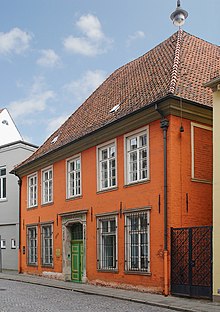Christian Abraham Heineken
Christian Abraham Heineken (born December 10, 1752 in Bremen ; † July 20, 1818 in Bremen) was Bremen's councilor and mayor .
biography
Heineken was the son of medicine professor Philipp Isaac Heineken. He studied law . In 1779 he was elected to the city council of Bremen. In 1792 he was appointed mayor of Bremen. Together with councilor Johann Gildemeister, he carried out the first trigonometric survey of Bremen. The copperplate engraver Georg Heinrich Tischbein engraved a map for this in 1798, which was reprinted in 1806 taking into account the expansion of the area in 1803. The French period in Bremen interrupted his mayor's office from 1811 to 1813 with the Département des Bouches du Weser . During this time he wrote a chronicle for the years 1750 to 1810, which has since been considered an important source of Bremen history and was not edited until 1983 by the archive director Wilhelm Lührs , was in press.
He created family trees for a large number (more than 170) of Bremen families and summarized them under the name of the genealogical register of old and new Bremen families . The name Golden Book later became common for this collection . It became known as the most productive secondary source for research into the many Bremen families listed in it.
The preserved old Bremen town house Haus Heineken at Sandstrasse 3 - right next to Haus Vorwärts , across from the Bremen Cathedral - was inhabited by Heineken and therefore popularly named after him. He always traveled the short distance from his house to the town hall in a carriage, which was walked by two council servants in red tails.
Also Heineken Park and Heineken's estate at the Oberneulander Highway 151/153 in Oberneuland were, since 1783 owned by Heineken and bear his name. The park and houses were partly built around 1762. Heineken was very dedicated to the further development of the park, especially in the English park style. Landesdenkmalpfleger Stein later described Heinekens Park with the hedge theater and the rare trees as Bremen's most precious garden.
His son Friedrich Wilhelm Heineken (1787–1848) became Syndicus of the Free Hanseatic City of Bremen in 1818 and Senator of Bremen in 1822. The medical professor and city physicist Johann Heineken was his brother.
Works
- History of the Free Hanseatic City of Bremen from the middle of the 18th century to the French era . Adapted by Wilhelm Lührs, Der Club zu Bremen publishing house , Bremen 1983.
- Gender register of old and new Bremen families (so-called Golden Book), manuscript (approx. 1808), Bremen State Archive.
See also
Individual evidence
- ^ A b Margarethe Haberecht: "Haus Heineken", Sandstrasse 3. In Bremen houses tell stories . Eds. Detlev G. Gross and Peter Ulrich. Döll Edition, 3rd edition, 1998.
- ^ Heinrich von Spreckelsen: Christian Abraham Heineken (1792–1818), a Bremen mayor , pp. 343, 344.
- ↑ Heinrich von Spreckelsen: Christian Abraham Heineken (1792-1818), a Bremen mayor , p. 340.
- ↑ online at the SuUB Bremen: http://nbn-resolving.de/urn:nbn:de:gbv:46:1-825
literature
- Herbert Black Forest : The Great Bremen Lexicon . 2nd, updated, revised and expanded edition. Edition Temmen, Bremen 2003, ISBN 3-86108-693-X .
- Heinrich von Spreckelsen: Christian Abraham Heineken (1792–1818), a Bremen mayor . North German Family Studies, Volume 13, 34th year, pp. 337–346.
- von Bippen: Heineken, Christian Abraham . In: Allgemeine Deutsche Biographie (ADB). Volume 11, Duncker & Humblot, Leipzig 1880, p. 365.
Web links
| personal data | |
|---|---|
| SURNAME | Heineken, Christian Abraham |
| BRIEF DESCRIPTION | Mayor of Bremen |
| DATE OF BIRTH | December 10, 1752 |
| PLACE OF BIRTH | Bremen |
| DATE OF DEATH | July 20, 1818 |
| Place of death | Bremen |

